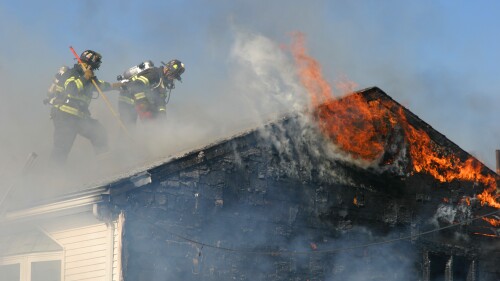Editor’s note: FireRescue1’s What Firefighters Want in 2025 delves into the topic of aggressive tactics and safety culture. Look for related content in the coming months and the release of the study findings in July.
By Brycen Garrison
The term “aggressive” has long been used in the fire service to describe a determined and proactive approach to emergency response. However, it may be time to reevaluate this term, as it can create a disconnect between fireground operations and the humility essential to servant leadership. Words matter, and the language we choose shapes the culture of our profession. If we approach things with “aggressive” as the mindset, we may lose the ability to approach and solve the problem from another perspective.
Let me explain why this matters to me. My personal mission is to energize, encourage and empower people using positivity to remove perceived roadblocks so they can become the best version of themselves in service to their communities. Through this lens, I want to challenge the fire service to adopt language and values that reflect professionalism, preparation and dedication over aggression.
The arrogance of aggression
When we think critically about the word aggressive, it doesn’t truly align with what we do in the fire service. Aggressiveness often arises from fear, bravado or negative energy, none of which represents the disciplined professionalism that our communities need and expect. One publication defines aggressive as prone to anger and hostilities along with a physiological description of bullying, fighting, cruelty and fire-setting. That’s not who we are; we are the light others look to for hope in some of the most difficult circumstances.
Firefighters, EMS providers and fire service leaders whom I admire have never described themselves as aggressive. Instead, they are thoughtful, disciplined and prepared individuals who inspire and serve with courage and humility.
Furthermore, I believe that aggression can lead to recklessness, blinding us to other solutions or perspectives. It stems from negative energy like fear, anger or frustration – emotions that can cloud judgment. Positive energy, built on preparation and professionalism, is far superior. As fire service professionals, our role is not to approach every challenge with aggression but rather to adapt, assess, and act with care and precision.
Preparation over aggression
The essence of professionalism lies in preparation, not aggression. Professionals:
- Spend time in the gym to ensure they are physically ready.
- Master their skills and equipment through practice, ensuring they can operate effectively under challenging circumstances.
- Prepare mentally and spiritually for the challenges they may face, from life-threatening situations to the emotional toll of the work as well as injuries or potentially deadly to yourself.
Preparation demands courage, discipline and dedication. It’s about serving others by making an impact through readiness, not a mindset that can easily slip into recklessness.
Consider this: In wildfire operations, you rarely hear the term aggressive. Why? Because success in those environments depends on strategy, adaptability and a deep respect for the unpredictable nature of the hazard. The same principles should guide us in structural firefighting and all aspects of our work.
The community perspective
When communities provide feedback during strategic planning, they don’t ask for aggressive firefighters. They want firefighters who embody discipline, courage, compassion and integrity. They want professionals who are prepared to respond with dedication and care.
Consider this: Would you want an aggressive doctor? Of course not. You’d prefer one who is knowledgeable, competent and prepared. Similarly, our communities expect us to bring professionalism to every situation.
Lessons from history and the Spartan Code
The fire service’s history is filled with lessons from those who made the ultimate sacrifice. Their sacrifices remind us to strive for a safer, more professional future. Like the Spartan warriors of old, who prepared tirelessly for battle but hoped to avoid it, we should embrace humility and preparation as our guiding principles.
Like the Spartans, true warriors – and true firefighters – don’t seek aggressive action. They seek to do the most good for as many people as possible, serving with courage and discipline.
Reframing our mindset
Describing ourselves as aggressive can limit our ability to adapt and respond effectively. An aggressive mindset can lead to tunnel vision, preventing us from seeing alternative solutions that require no aggression at all. Instead, we should cultivate a calm, flexible and adaptive mind.
The future of the fire service will look different, and it demands that we think differently. By focusing on preparation, adaptability and servant leadership, we can pass on a fire service that is better equipped to serve future generations.
Final thoughts
Aggressiveness isn’t what makes someone a great firefighter. It’s the discipline to prepare, the courage to perform, and the humility to serve. Fires will always go out, whether or not you label yourself as aggressive. Our job is to ensure that when we respond, we represent the best in humanity—calm, disciplined, and ready to serve.
Let’s lead with the right language and mindset, ensuring that the fire service continues to grow as a beacon of professionalism and service to our communities.
ABOUT THE AUTHOR
Brycen Garrison is the fire chief of the Brighton Fire Rescue District in Colorado. Garrison has over two decades of leadership experience in emergency services, having previously served as assistant chief of training and special operations for the City of Thornton Fire Rescue, and having worked as a rescue tool specialist, teaching advanced extrication techniques to firefighters across the country. Garrison holds a master’s degree in emergency services management from Columbia Southern University and a bachelor’s degree with an emphasis in psychology and sociology from Colorado State University. He is a Certified Fire Officer (CFO) and previously a Chief Training Officer (CTO) through the Center for Public Safety Excellence (CPSE). Garrison is also a part of multiple fire chief associations, boards of directors and community leadership groups.














